Understanding the Deep Psychological Effects of Family Separation
Family separation in long-term care settings, exacerbated by policies, pandemics, and institutional practices, can lead to significant long-term emotional and psychological harm for residents. This article explores the stages of emotional adjustment, systemic issues driving separation, and effective strategies for mitigating distress, emphasizing the importance of maintaining family bonds for mental health and well-being.
Psychosocial-Spiritual Processes of Involuntary Family Separation
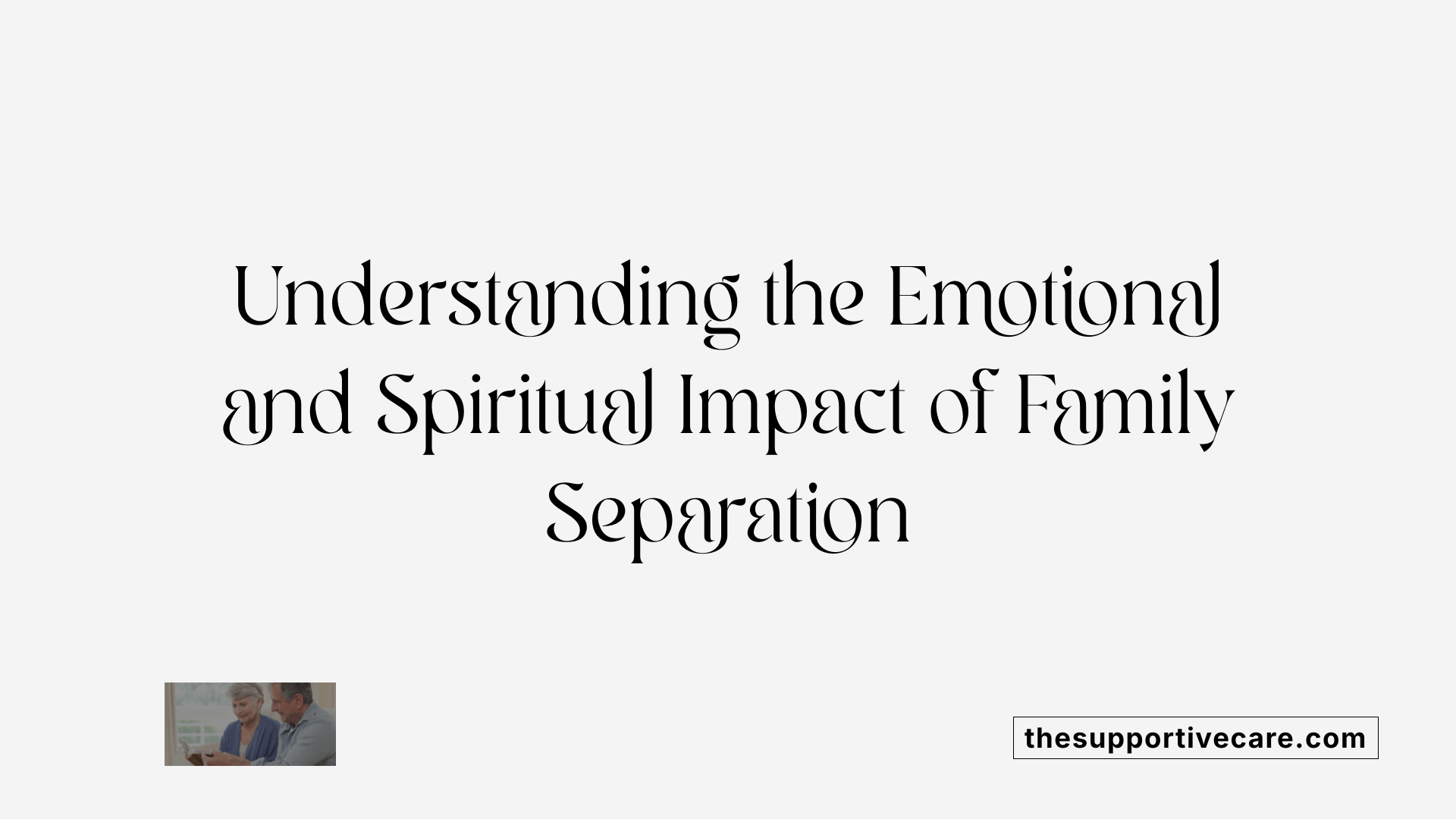
What is the psychological, social, and spiritual impact of involuntary family separation?
Family separation, particularly when sudden and involuntary, deeply influences individuals’ mental health, social connections, and spiritual well-being. Spouses, children, and parents face intense feelings of loneliness, grief, guilt, and despair. These emotional responses are often reinforced by disrupted bonds with loved ones, leading to a profound sense of loss that can last long after reunification.
Separation acts as a form of toxic stress, activating biological stress systems and causing long-term physiological and psychological harm. Children especially are vulnerable to adverse development, experiencing difficulties with attachment, emotional regulation, and social functioning. Adults, such as separated spouses or caregivers, may grapple with depression, anxiety, and a diminished sense of purpose.
Spiritual connections—faith and belief systems—often serve as crucial sources of comfort. When disconnected from spiritual communities or practices, individuals may experience additional despair, hampering their resilience during prolonged periods of separation.
In healthcare contexts, such as long-term care (LTC), forced separation due to policies or safety measures severely affects residents’ emotional health. Restrictions on visits—initially motivated by infection control—have led to increased feelings of isolation, with residents expressing feelings of abandonment and hopelessness. Family members, deprived of in-person contact, often experience heightened guilt and helplessness, further intensifying their emotional distress.
How do the stages of coping unfold during involuntary separation?
The process of coping with involuntary separation typically unfolds in three stages:
Initial coping: This stage involves shock, acute grief, guilt, and sometimes feelings of failure. Many spouses and family members strive to maintain hope and cling to routines or virtual communication methods despite emotional turmoil.
Adjusting to the new situation: Over time, individuals develop new routines, advocate for their loved ones, and cope with loneliness and ongoing guilt. Developing alternative social connections and finding new spiritual or community supports become vital during this phase.
Moving forward: The final stage is characterized by acceptance and resilience. In this phase, individuals often forge new identities, reconcile with the separation, and find ways to reconnect emotionally and spiritually. Some reconnect through community, faith, or new social roles.
What are the core connection points affecting these stages?
Four primary forms of connection—identity, family, social environment, and faith—are central to the psycho-social-spiritual journey through separation.
- Identity: How individuals see themselves in relation to their loved ones influences their emotional resilience.
- Family: Family bonds provide emotional support but can also be sources of guilt or regret during separation.
- Social world: Friendships, community ties, and social activities help buffer loneliness and maintain a sense of belonging.
- Faith: Religious and spiritual practices often serve as vital coping mechanisms, offering hope and meaning.
The ability and willingness to seek connection through these domains, along with empathetic support from others, significantly influence how well a person navigates each stage.
How do connection and disconnection influence mental health?
Experiences of connection reinforce feelings of safety, purpose, and hope, fostering resilience. Conversely, disconnection — whether physical, emotional, or spiritual — amplifies loneliness, depression, and anxiety. During involuntary separation, lack of contact can cause deterioration of mental health, particularly when support systems are limited.
Research indicates that ongoing efforts to facilitate meaningful communication—such as virtual visits, community programs, or spiritual support—are essential. These interventions help maintain the core connections that sustain individuals through their psychosocial and spiritual challenges.
Addressing systemic issues in long-term care visitation policies
Despite the importance of family presence, restrictive policies persist, often grounded in outdated infection control practices rather than current evidence. Systemic issues include reliance on rigid protocols, lack of stakeholder involvement, and the absence of flexible frameworks that balance safety with psychosocial needs.
These restrictions have led to preventable harms such as worsened depression, cognitive decline, and social isolation among residents. Families feel unprepared and upset, often experiencing guilt and helplessness, further impacting their well-being.
To address these systemic problems, policy reforms should emphasize ethical principles—beneficence, nonmaleficence, autonomy, and justice. Implementing evidence-based guidelines that allow safe visitation, including technological alternatives and increased staffing for engagement, is crucial.
Healthcare systems must promote structural changes like staff training, technological investments, and inclusive policy development that prioritize residents’ emotional and spiritual health. Recognizing family presence as an essential component of care safeguards mental health and overall well-being.
| Aspect | Current Challenges | Policy Recommendations | Impact on Well-being |
|---|---|---|---|
| Visitation Restrictions | Outdated protocols, lack of stakeholder input, rigid safety measures | Develop flexible, evidence-based visitation policies that adapt to local context | Reduces isolation, enhances emotional health, preserves dignity |
| Support Infrastructure | Limited technological tools, staffing shortages | Invest in technology, staff training, and community engagement programs | Maintains connection, supports social and spiritual needs |
| Ethical Frameworks | Focus on infection control over psychosocial needs | Incorporate ethical principles into policy development | Promotes balanced approach, holistic resident care |
| Family Involvement | Limited opportunities for family engagement | Establish regular communication channels, involve families in decision-making | Improves resident outcomes, reduces family distress |
Through systemic reforms and compassionate policies, the emotional, social, and spiritual health of LTC residents and their families can be better protected, even amid necessary safety measures during public health crises.
Long-Term Psychological Effects of Separation on Residents
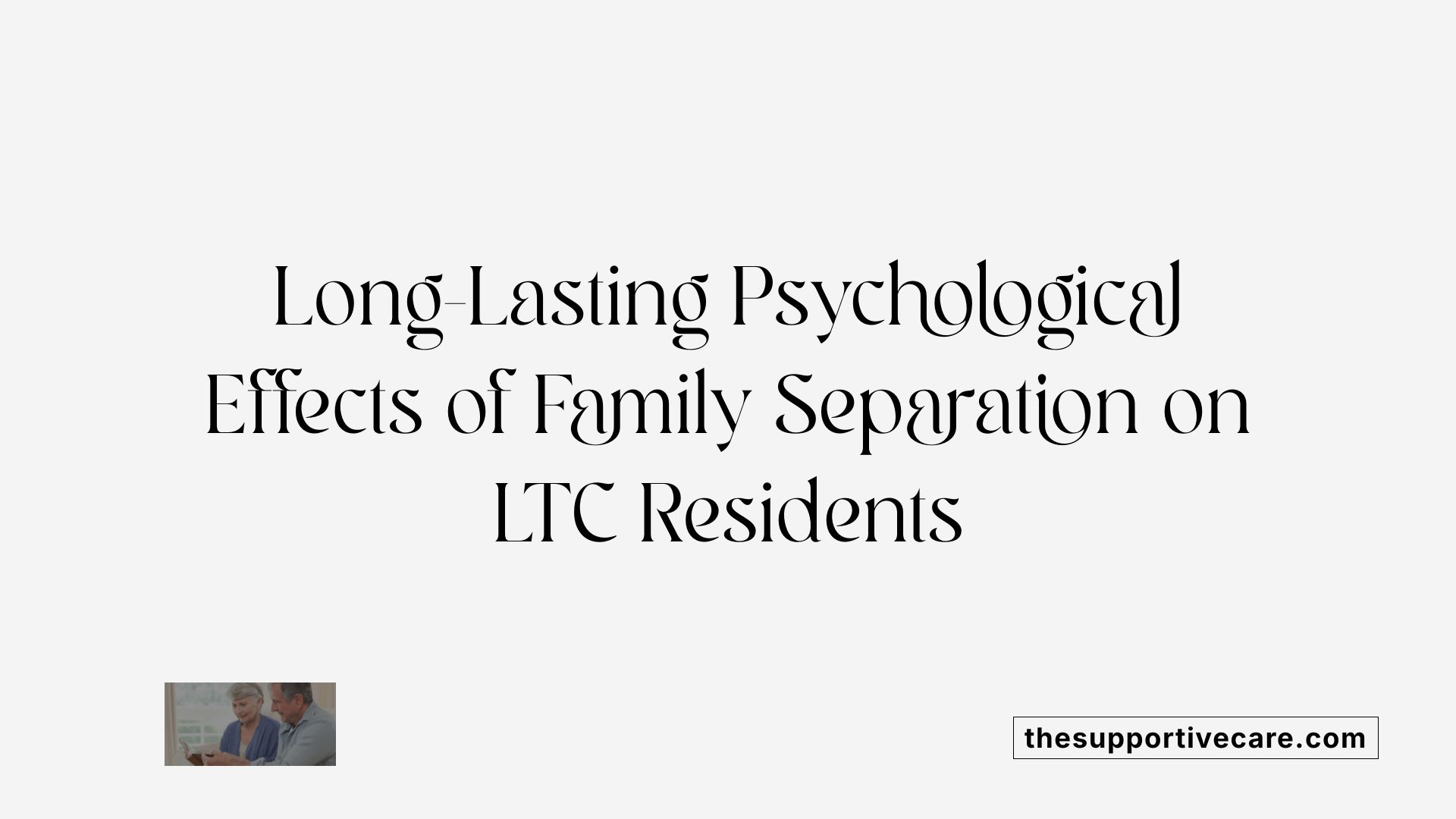
What are the long-term mental health effects of family separation on residents in long-term care settings?
Family separation within long-term care (LTC) environments can cause enduring psychological consequences for residents. One of the most common and profound effects is an increase in feelings of loneliness. When spouses or loved ones are physically absent, the resident's sense of connection diminishes, leading to persistent social isolation.
This social disconnection often manifests as depression and emotional distress that can linger over months or even years. Healthcare staff frequently observe signs of emotional pain, such as crying, withdrawal, and apathy, which are indicative of deeper psychological suffering.
Separation impacts not just emotional well-being but also physical health. The loss of tactile and social interactions can deteriorate residents’ overall health, exacerbate existing conditions, and impair recovery. Notably, the lack of family presence limits opportunities for emotional regulation and supports essential for a resident's mental resilience.
While some residents temporarily experience relief from the stress of caregiving responsibilities, many continue to grapple with long-term feelings of loss. These feelings are often compounded by reduced social networks and the inability to maintain meaningful interactions with loved ones.
Several factors influence the degree of mental health impact, including the severity of physical and cognitive impairments, the length of separation, and pre-existing mental health conditions. Residents with severe impairments or those who experienced prolonged separation are particularly vulnerable to lasting emotional trauma.
Implementing targeted psychological interventions, such as counseling and trauma-informed care, can alleviate some distress. Promoting social engagement through organized activities, virtual contact, and community involvement plays a critical role in mitigating feelings of isolation.
In addition, fostering connections with family members and integrating them into the care process—despite physical barriers—can significantly improve mental health outcomes. Technology, such as video calls and virtual visits, has been instrumental during pandemic conditions, allowing residents to maintain bonds and express their emotions.
Overall, addressing the mental health impacts of family separation requires a comprehensive approach that combines emotional support, community engagement, and innovative communication strategies. Recognizing and acting upon these needs can help reduce long-term psychological distress among LTC residents.
Trauma from Family Separation in Immigrant Families
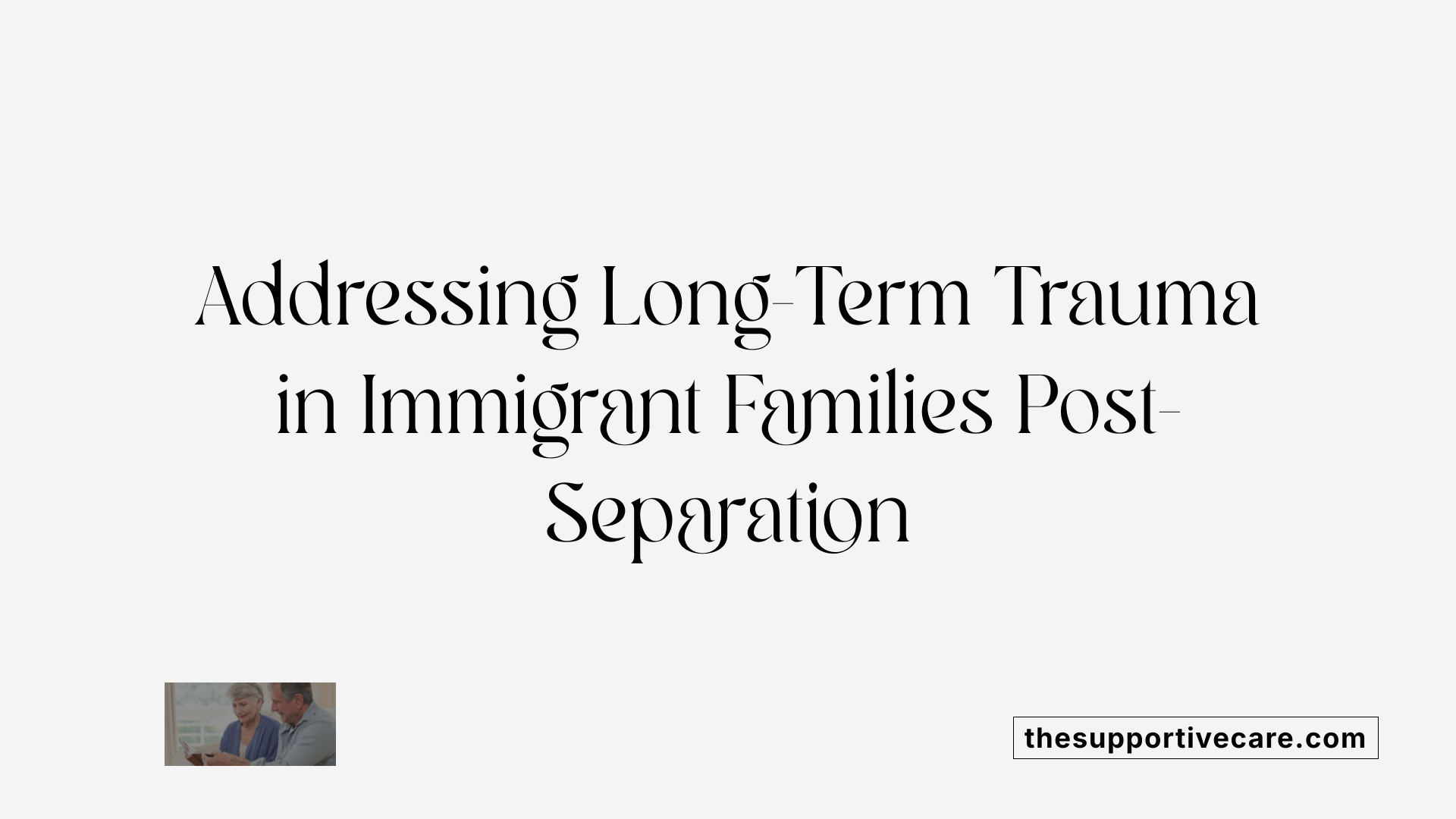
What are the long-term mental health and trauma-related impacts of family separation in immigrant families?
Family separation during immigration processes has deep and lasting effects on both children and parents’ mental health. Many individuals experience intense psychological distress, including depression, anxiety, and Post-Traumatic Stress Disorder (PTSD). These symptoms often persist long after physical reunification, suggesting that the trauma caused by abrupt and enforced separation leaves enduring scars.
Children separated from their parents face disrupted attachment bonds, which are crucial during early development. This disruption can lead to difficulties in emotional regulation, lower self-esteem, and problems forming healthy relationships later in life. Many children develop behavioral issues, with some exhibiting increased aggression, withdrawal, or academic struggles as a result.
In parents, separation generates feelings of helplessness, profound grief, guilt, and despair. Such emotional distress can impair their ability to provide support during reunification and hinder their recovery process. The trauma often manifests in symptoms like hyperarousal, intrusive memories, and heightened anxiety.
Trauma's physical health consequences extend beyond immediate emotional distress. Chronic stress from family separation can activate the body’s stress response system excessively, leading to long-term health risks such as heart disease, diabetes, and even cancer. The ongoing physiological toll exemplifies how deeply trauma affects overall well-being.
Research points to a cascade of effects: traumatic early experiences impair brain structures like the hippocampus and prefrontal cortex—areas involved in memory, decision-making, and emotional control. Such neurobiological impacts can influence cognitive functioning and increase susceptibility to mental health conditions.
Disrupted attachment and prolonged stress also impair children's social and academic development. Many face delays in learning, struggle with emotional regulation, and carry these difficulties into adolescence and adulthood.
The extended impacts of family separation underscore the urgent need for policies that prioritize keeping families together. Preventing separation and facilitating swift reunification can mitigate these adverse outcomes, promoting healthier psychological and physical development for affected children and parents alike.
How does family separation affect developmental and physical well-being?
Separation from primary caregivers during critical developmental periods—especially in early childhood—acts as a toxic stressor. This excessive stress activation hampers normal brain development, affecting structures such as the hippocampus and prefrontal cortex. These brain regions are vital for memory, emotional regulation, and executive functioning.
Children exposed to such trauma often exhibit increased fear, difficulty trusting others, and problems with self-regulation. Long-term, they are at higher risk for depression, anxiety, and externalizing behaviors like aggression or delinquency.
Physical health effects also include heightened cortisol levels associated with sustained stress. Over time, this can contribute to cardiovascular disease, metabolic syndromes, and immune system dysregulation.
Furthermore, traumatic experiences may disrupt normal social and academic development, leading to poor educational outcomes and social skills deficiencies.
Long-Term Outcomes and the Need for Policy Change
The enduring psychological effects of family separation encompass increased risks for mental illnesses like PTSD, depression, and anxiety in both children and adults. Many suffer from persistent feelings of hopelessness, fear, and emotional numbness.
Physically, prolonged stress has been linked with increased morbidity from chronic illnesses. The trauma impacts not only mental and physical health but also influences broader social functioning, potentially perpetuating cycles of disadvantage.
Scientific evidence strongly supports the importance of maintaining family integrity wherever possible. Policies that avoid unnecessary separation, ensure swift reunification, and provide mental health support can significantly reduce these long-term impacts.
In conclusion, the long-lasting effects of family separation extend into multiple facets of health and development. Addressing this issue requires comprehensive strategies that prioritize family unity and trauma-informed care to foster resilience and recovery.
| Impact Area | Description | Supporting Evidence |
|---|---|---|
| Mental health | Increased depression, PTSD, and anxiety in children and parents | Long-term trauma effects documented in multiple studies |
| Development | Disrupted attachment, cognitive delays, social difficulties | Studies show delayed neurodevelopment and insecure attachment |
| Physical health | Elevated risk for chronic diseases (heart, diabetes) | Chronic stress activates harmful physiological responses |
| Behavioral outcomes | Increased aggression, social withdrawal | Trauma-linked externalizing and internalizing behaviors |
| Policy implications | Need for family-preserving immigration and care policies | Evidence-based recommendations emphasize family unity |
Understanding and addressing the profound, long-lasting impact of family separation on immigrant families is essential. Implementing trauma-informed policies can help mitigate these effects and promote healing and resilience.
Policy and Systemic Challenges in Family Presence
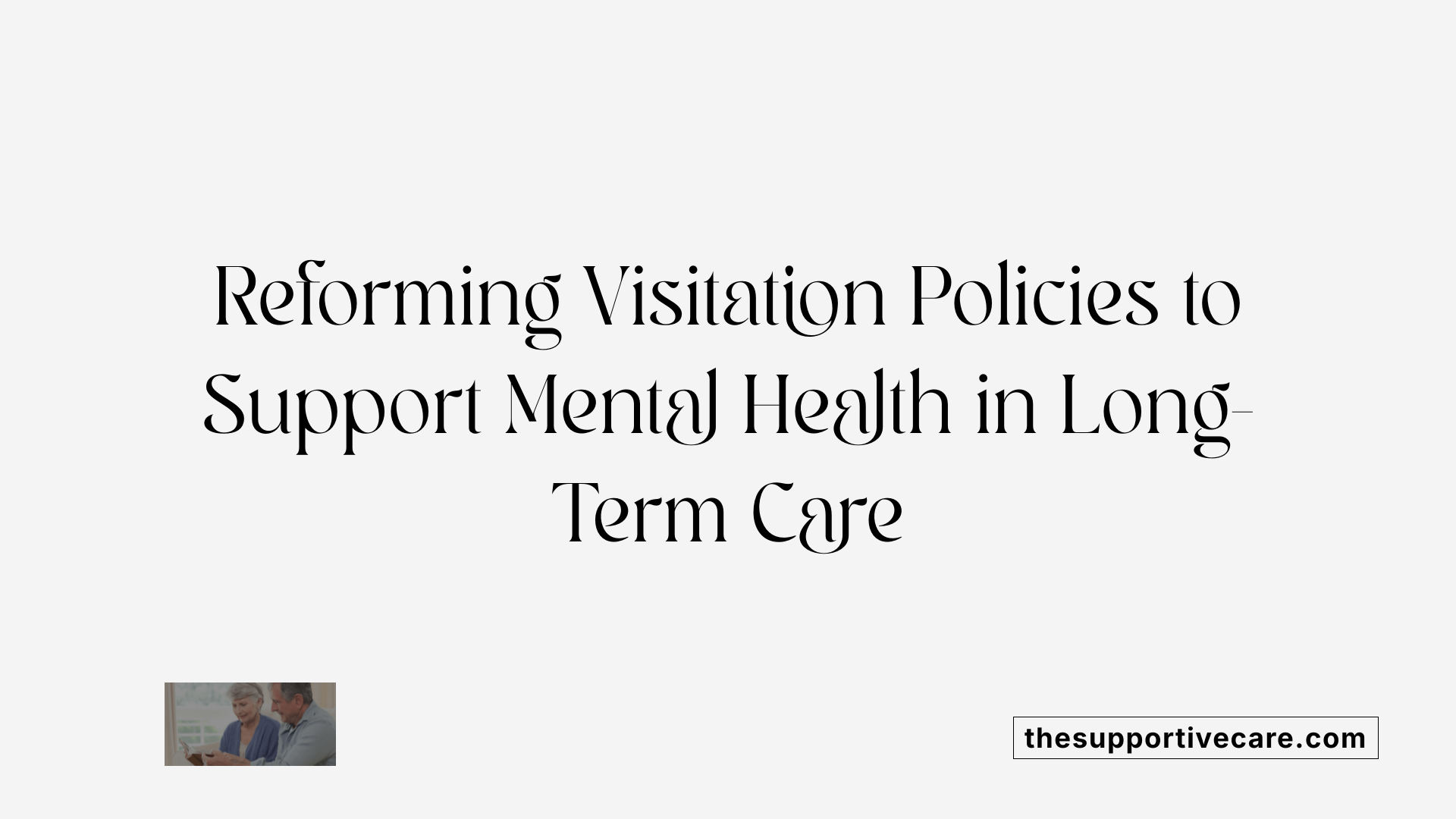
What are some systemic issues and policy implications related to family presence restrictions in long-term care, and how do they affect psychosocial wellbeing?
Systemic issues surrounding family presence restrictions stem primarily from outdated infection control policies that do not adequately balance safety with the psychosocial needs of residents. Many policies continue to prioritize prevention of infection over the mental health and emotional well-being of both residents and their families.
A significant problem is the lack of involvement of key stakeholders—such as residents, families, healthcare providers, and advocacy groups—in developing visitation policies. This disconnect often results in rigid restrictions that lack flexibility or context-specific considerations.
Furthermore, there is insufficient integration of evidence-based practices. Emerging research shows that with proper precautions, safe visitation can be maintained, helping to prevent social isolation, depression, cognitive decline, and deterioration of overall health in residents.
Policy frameworks rooted in ethical principles like beneficence (promoting well-being), nonmaleficence (avoiding harm), autonomy (respecting choice), and justice (equitable access) are essential. These principles support the development of adaptive, transparent, and humane visitation policies.
Reforms should include structural changes, such as implementing technological solutions (video calls, virtual visits), increasing staffing to assist with social engagement, and involving families in care planning.
Overall, addressing these systemic issues requires a comprehensive approach that values psychosocial health equally with physical safety, ensuring that policies protect residents holistically.
| Systemic Issue | Policy Implication | Potential Benefits |
|---|---|---|
| Outdated infection control policies | Develop evidence-informed flexible guidelines | Reduced social isolation, maintained mental health |
| Lack of stakeholder involvement | Inclusive policy-making processes | Policies that reflect real needs and preferences |
| Insufficient use of technology | Investment in digital communication tools | Enhanced family connections during restrictions |
| Staffing shortages for engagement | Increased staffing and training in psychosocial care | Better emotional support for residents |
How do policies, COVID-19 visitation restrictions, or institutionalization impact residents and their families emotionally?
Policies enforcing visitation restrictions, particularly during the COVID-19 pandemic, have had profound emotional impacts. Residents experienced increased feelings of loneliness, depression, anxiety, and emotional trauma due to physical separation from loved ones.
For families, the inability to visit has been a source of considerable distress, guilt, and helplessness. Administrators and healthcare workers observed that these restrictions exacerbated existing mental health issues and led to a sense of disconnection and despair.
Even when alternative methods such as virtual visits were employed, many residents and families reported that these options could not fully substitute in-person contact. The absence of physical presence—touch, shared activities, and direct interaction—has been linked to declines in residents’ mood, cognitive function, and overall quality of life.
In some cases, families reported feelings of grief and unresolved trauma, as separation during critical health events or end-of-life moments prevented meaningful closeness. This emotional toll may result in long-term psychological effects that extend beyond the period of restrictions.
In summary, policies that limit family presence can disrupt vital emotional bonds, leading to significant harms. Thus, it is essential that policies consider the emotional and mental health impacts and strive to incorporate safe ways to maintain family connections.
| Impact on Residents | Impact on Families | Proposed Strategies |
|---|---|---|
| Increased loneliness and depression | Feelings of guilt, helplessness | Improve access to technology, facilitate safe visits |
| Cognitive decline and behavioral issues | Anxiety, despair | Incorporate mental health support and counseling |
| Emotional trauma, especially at end-of-life | Grief and unresolved trauma | Allow compassionate and controlled in-person visits |
| Reduced quality of life | Sense of disconnection | Engage families in care planning and updates |
This comprehensive understanding underscores the importance of creating policies that balance safety with emotional and social needs, recognizing that family presence is integral to holistic resident care.
Interventions and Strategies to Address Emotional Challenges
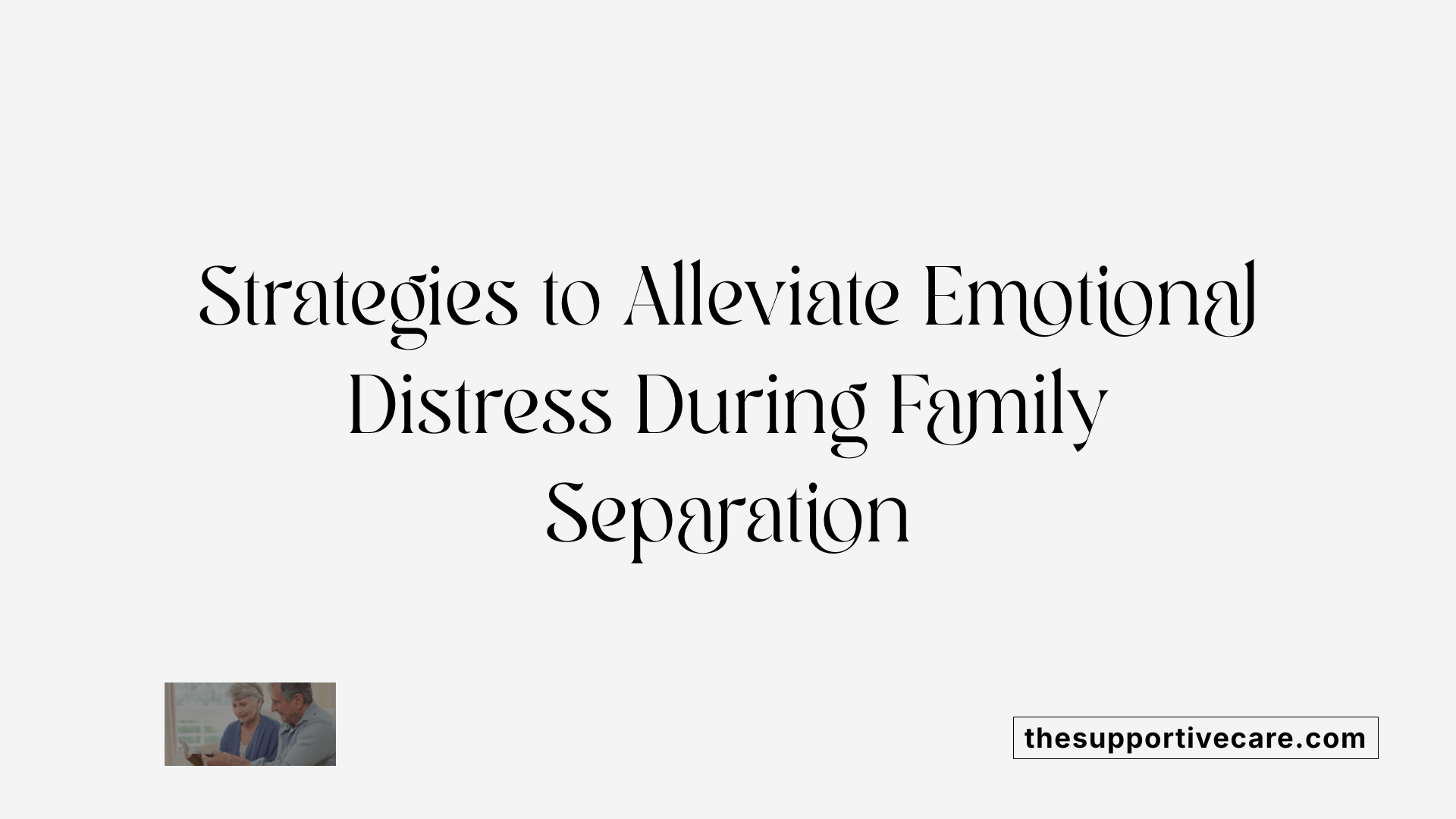
What strategies and policies can help mitigate the emotional challenges faced by residents and families resulting from family separation?
Addressing the profound emotional impact of family separation requires a combination of compassionate policies and targeted clinical practices. One essential policy step is to establish and enforce safe visitation protocols, especially in settings like long-term care facilities and detention centers, to keep families connected. During crises like the COVID-19 pandemic, creative use of technology—such as video calls, virtual visits, and digital communication platforms—became vital in maintaining bonds.
Healthcare providers and policymakers can also introduce mental health support programs tailored for separated families. Counseling services, peer support groups, and grief therapy—like Family Focused Grief Therapy (FFGT)—are effective in helping individuals express their feelings, share experiences, and develop coping mechanisms.
Training for healthcare staff is another critical component. Equipping caregivers and professionals with skills in active listening, empathetic communication, and conflict resolution promotes respectful and supportive interactions that foster resilience. These professionals can better manage emotional distress, facilitate open dialogue, and help families navigate complex decisions.
Furthermore, integrating family-centered care policies emphasizes respecting family roles and preferences. Advance care planning and regular updates about loved ones’ health status help reduce uncertainty and foster a sense of control and involvement.
Overall, a cohesive approach combining policy reforms, technological tools, and specialized training can significantly ease the emotional toll of separation, ensuring families and residents receive the support they need during vulnerable times.
Family-centered care approaches
Family-centered care prioritizes the needs and values of families, encouraging active participation in care decisions. This approach involves regular communication, respecting cultural and emotional needs, and supporting family involvement.
Therapeutic interventions, support programs
Structured therapy options, such as grief counseling and support groups, address emotional distress head-on. Community and hospital-based programs provide safe spaces for expression and healing.
Use of technology to maintain connections
Utilizing video calls, messaging apps, and virtual meeting platforms helps families bridge the gap created by physical separation. Regular virtual contact can alleviate loneliness and sustain emotional bonds.
Training for healthcare staff
Training staff in empathetic communication, trauma-informed care, and conflict de-escalation enhances their ability to support families effectively. Empowered staff can better address emotional challenges and promote positive interactions.
| Strategy | Description | Intended Outcome | Additional Notes |
|---|---|---|---|
| Safe visitation policies | Establish protocols for family visits, including virtual options | Reduce emotional distress and maintain bonds | Important during health crises like COVID-19 |
| Mental health support programs | Counseling, support groups, grief therapy | Address grief, anxiety, and depression | Tailored to different needs across populations |
| Technology use | Video calls, messaging platforms | Maintain communication, lessen loneliness | Requires technological access and literacy |
| Staff training | Empathy, trauma-informed care, communication skills | Improve support quality and emotional management | Continuous education essential |
By adopting these comprehensive strategies, healthcare systems and policymakers can better support families facing separation. This holistic approach nurtures emotional resilience and promotes healing, even amidst unavoidable circumstances of separation.
Moving Toward Compassionate, Evidence-Informed Policy Reform
The long-term psychological impacts of family separation in long-term care and among vulnerable populations are profound and multifaceted, requiring immediate attention and systemic change. Policies that prioritize the emotional and psychological well-being of residents and families, integrated with research-backed intervention strategies, can help minimize trauma and foster resilience. It is imperative for healthcare systems, policymakers, and communities to collaborate in creating supportive environments that sustain familial bonds, promote mental health, and uphold human rights. Only through comprehensive reform can we ensure that emotional healing and compassionate care remain central to the policies governing long-term care and immigration, safeguarding the dignity and long-term well-being of all individuals affected by separation.
References
- The social process of involuntary separation and the search for ...
- Overcoming the Challenge of Family Separation From Nursing ...
- The impact of a partner's nursing home admission on individuals ...
- Residents' and spouses' experiences of loneliness and depression ...
- The Persistent Psychological Effects of Family Separation - PHR
- The Health Effects of Child Separation
- The Science is Clear: Separating Families has Long-term Damaging ...
- Impacts of Family Separation, Yet Resilience and Hope for the Future



































































































